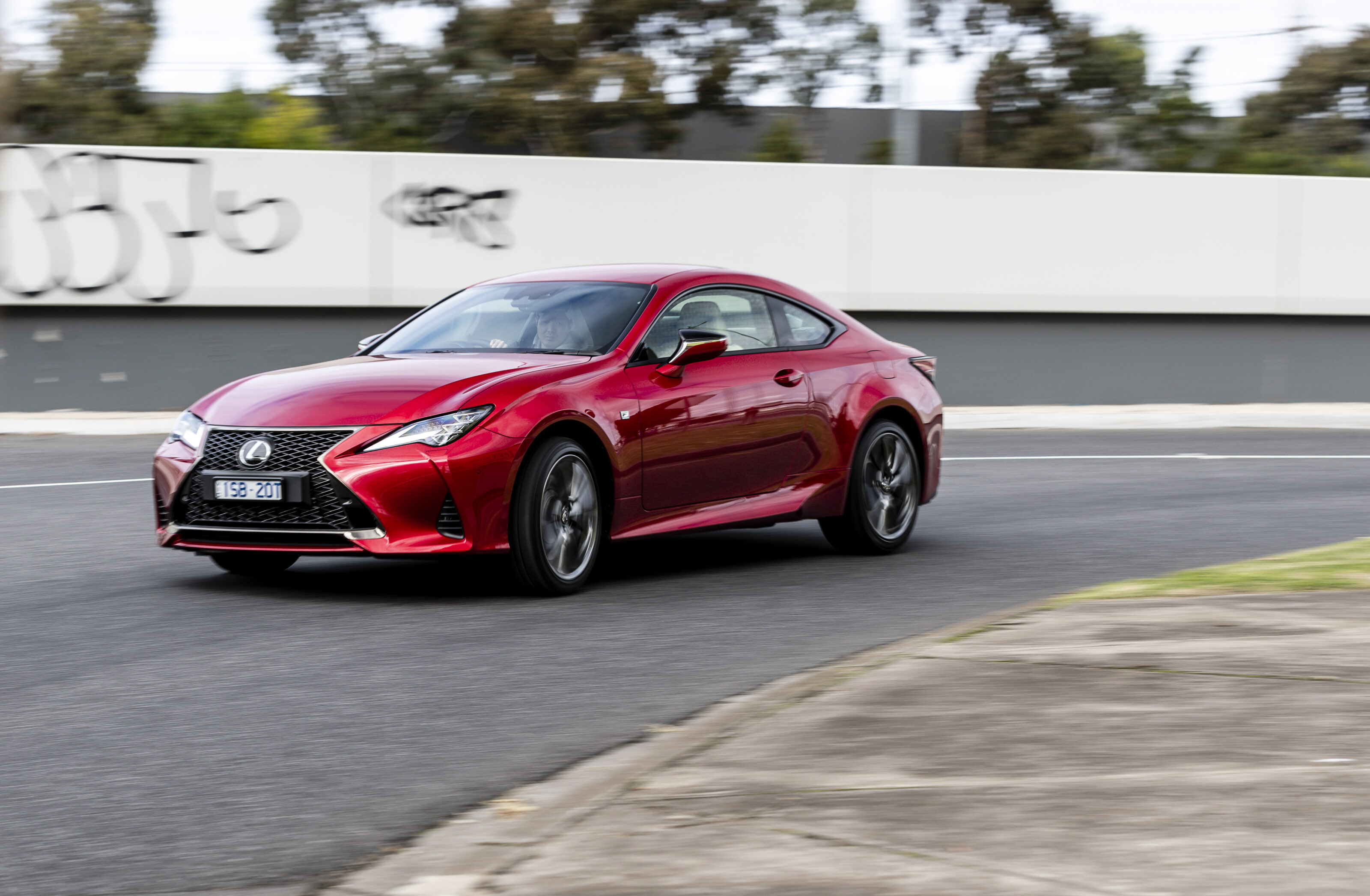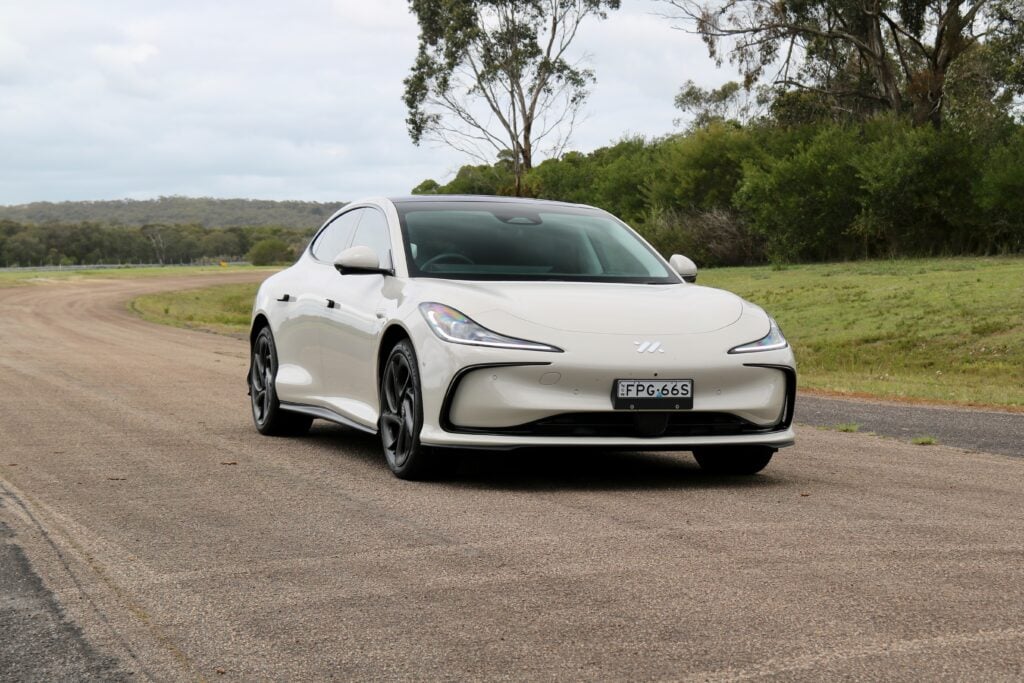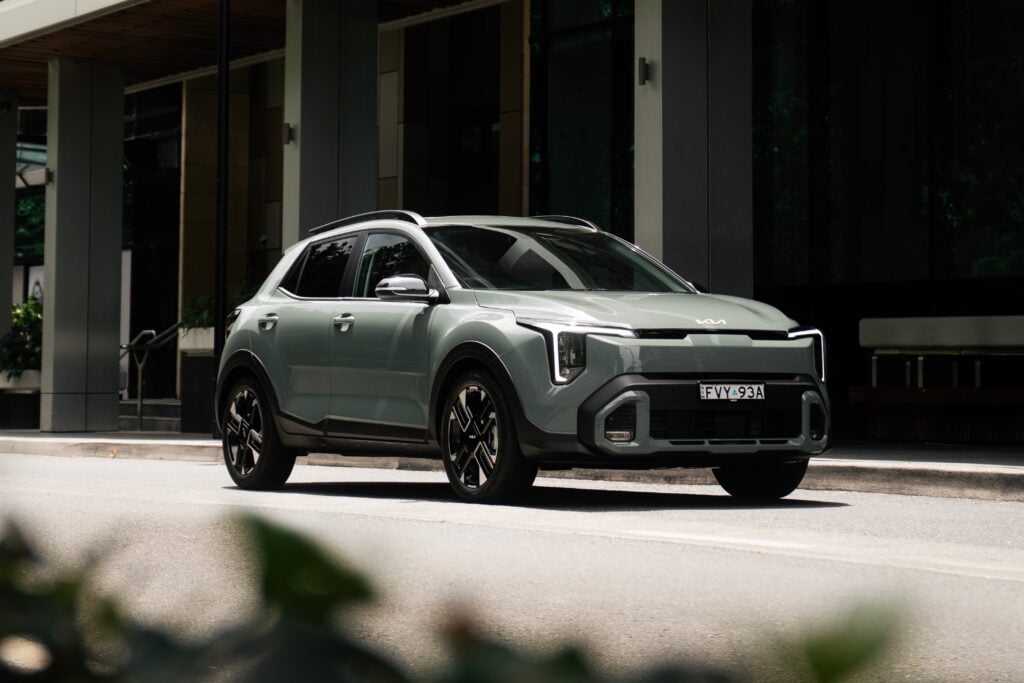Things we like
- Well-equipped
- Style in spades
- Lovely day-to-day driver
Not so much
- Characterless engine
- Outmoded tech compared to rivals
- Trackpad interface
I’m milling about in a South Melbourne car park as snapper Ellen Dewar clicks away at her camera.
The Lexus RC 300 F Sport sits before us, gleaming in its Infrared paint, striking us with its myriad creases and folds. It’s a good-looking car and, judging from the kerbside test, you’d never even guess that it’s fitted with the entry-level engine unless you knew what the badge on the back meant.
Lexus sells a mere fraction of mainstream coupes in comparison to the volumes pumped out by Germany’s dominant Big Three, so it’s fair to assume that many aren’t able to decipher those names and numbers on the back of this svelte Japanese two-door.
So here’s a quick explainer: the ‘300’ nomenclature refers to the presence of Lexus’ frugal 180kW/350Nm turbo four-cylinder; while those F Sport badges on its flanks signal a $75,736 (before on-roads) price tag and the standard inclusion of some sporty equipment such as triple-stack LED headlights and LED daytime running lights, adaptive variable suspension, two further drive modes (adding a sharper Sport S+ and Custom modes), a Torsen limited-slip differential, upgraded brakes and F Sport interior embellishments.
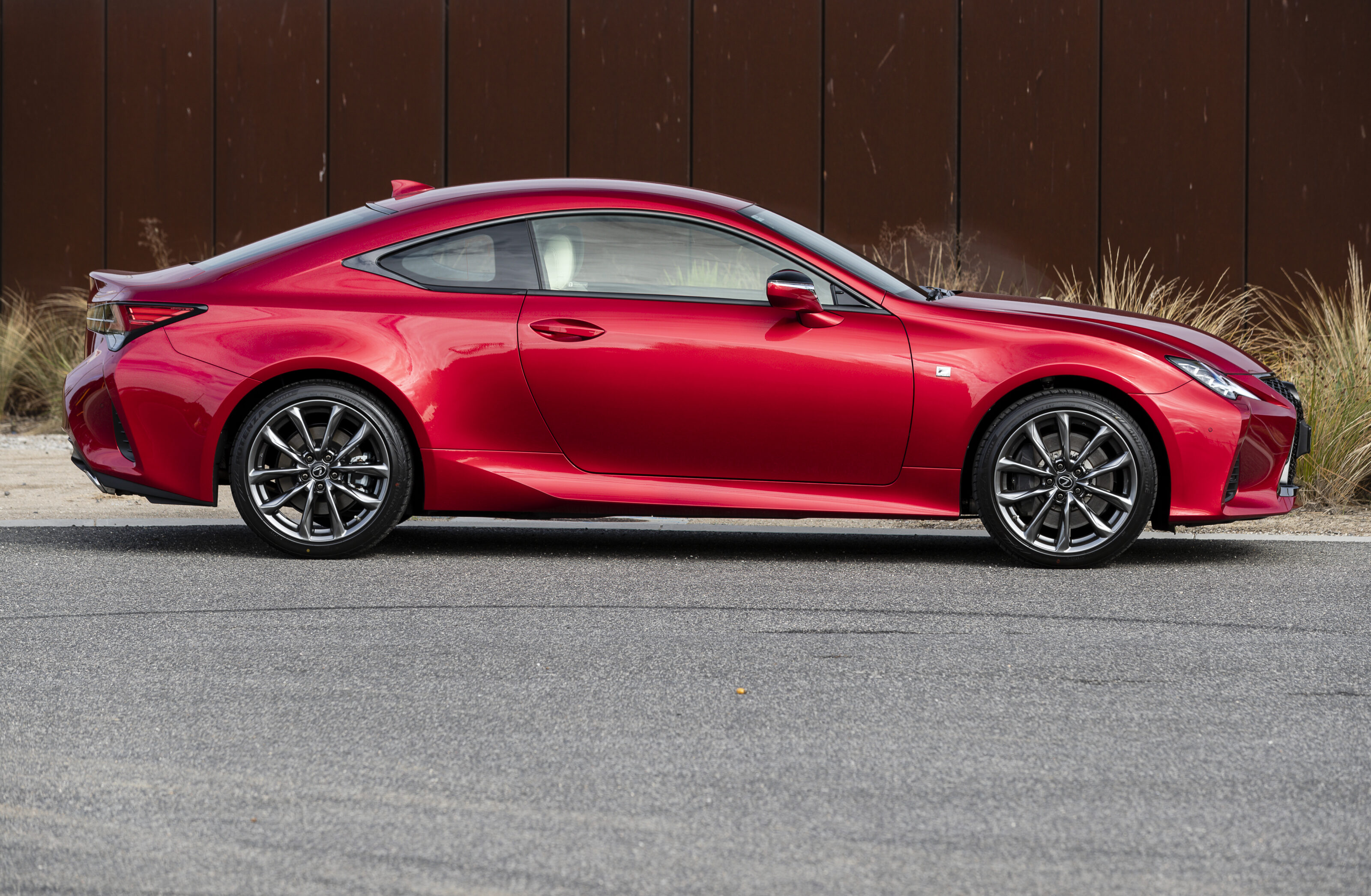
At that price point, buyers will likely be cross-shopping with the more established 140kW/320Nm Audi A5 40 TFSI S Line Coupe ($71,900), 135kW/300Nm BMW 420i ($71,900), and 150kW/300Nm Mercedes-Benz C200 coupe.
A 2021 model refresh brought a host of refinements to the RC range, too. The eight-speed transmission has been updated with revised software that aims to better predict shift points and will even downshift of its own accord when it detects hard braking and deceleration. Some weight has been trimmed from the rear end, with aluminium upper control arms fitted, as well as a beefier anti-roll bar.
Radar active cruise control featuring stop-and-go capabilities has also been gifted to all variants, as well as Lexus’ Safety System+ package comprising AEB with pedestrian detection, automatic high beam, lane-departure warning with steering assist, blind-spot monitor, lane-change alert and rear cross-traffic alert.
Added tech, in line with other models in the Lexus portfolio, also includes a larger touch-sensitive 10.3-inch infotainment screen with Apple CarPlay and Android Auto and an LFA-style TFT instrument cluster, on top of standard-fit items like dual-zone climate control, 10-speaker Pioneer audio system, and heated and cooled front seats.
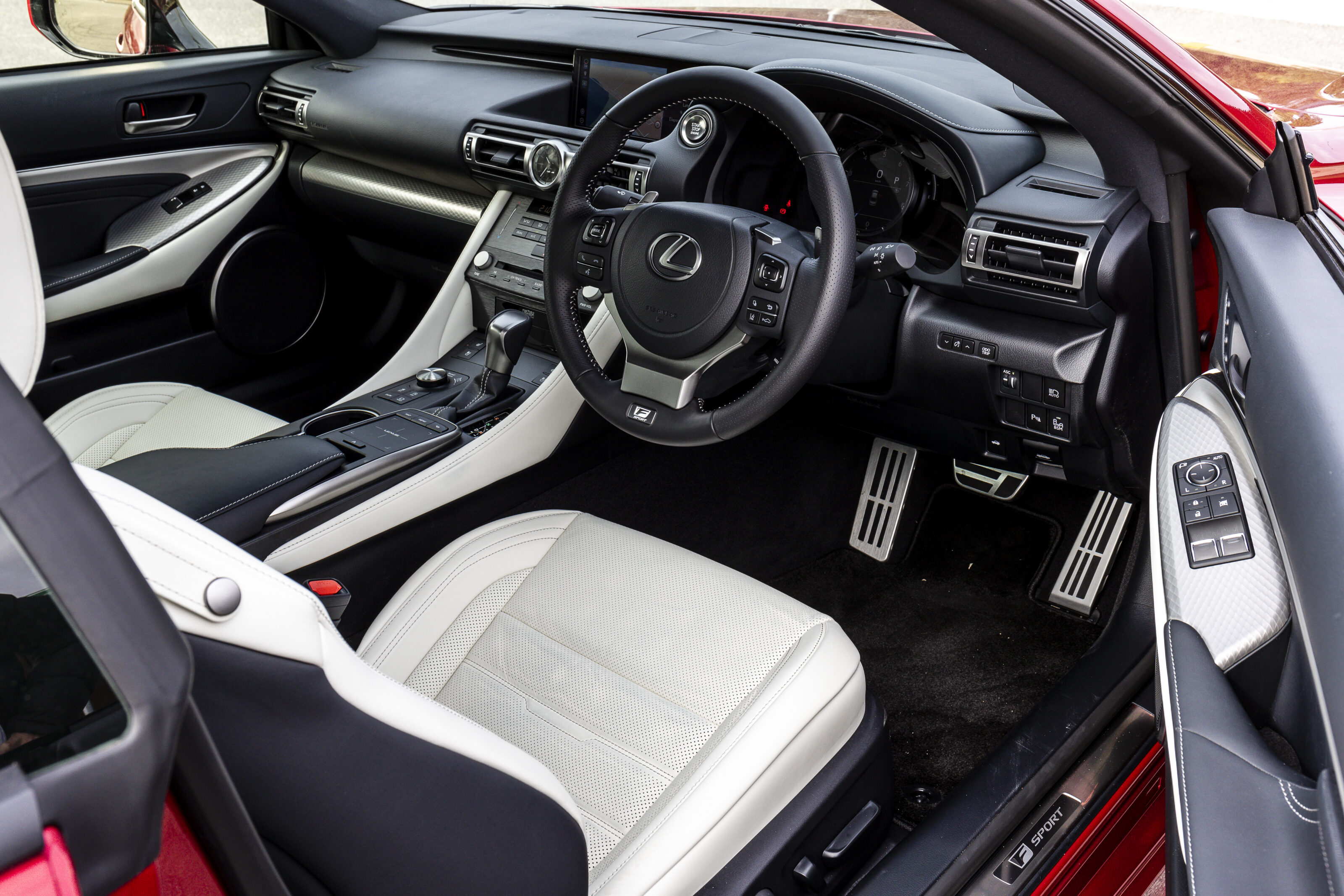
The generous list of standard equipment, along with the F Sport’s added styling cues, sees the entry-level RC coupe shrug off any semblance of a poverty-pack persona and, from the driver’s seat around town, it’s tremendously easy to forget that you’re not behind the wheel of a fully-loaded top-spec offering.
Until you put your right foot down, that is. The turbocharged 2.0-litre four-cylinder is a frugal and economical unit but lacks the top-end stamina (not to mention the aural character) of the larger and more powerful naturally aspirated 3.5-litre V6.
In the real world, the little mill is fast enough in the context of modern metropolitan traffic and will get away from the lights agreeably, Lexus claiming a 0-100km/h time of 7.0 seconds. It feels just as quick from a dig as the bigger V6 but with power peaking between 4800-5600rpm (and torque between 1650-4000rpm), it quickly runs out of puff just as the big six begins hitting its stride.
Lexus’ typically possess an inherent comfort to their ride and character, although more powerful models display a wider breadth of talent and a stronger duality of character thanks to their increased ability to be hustled about when the situation calls for it. The RC300, though, firmly errs on the side of plush rather than performance.
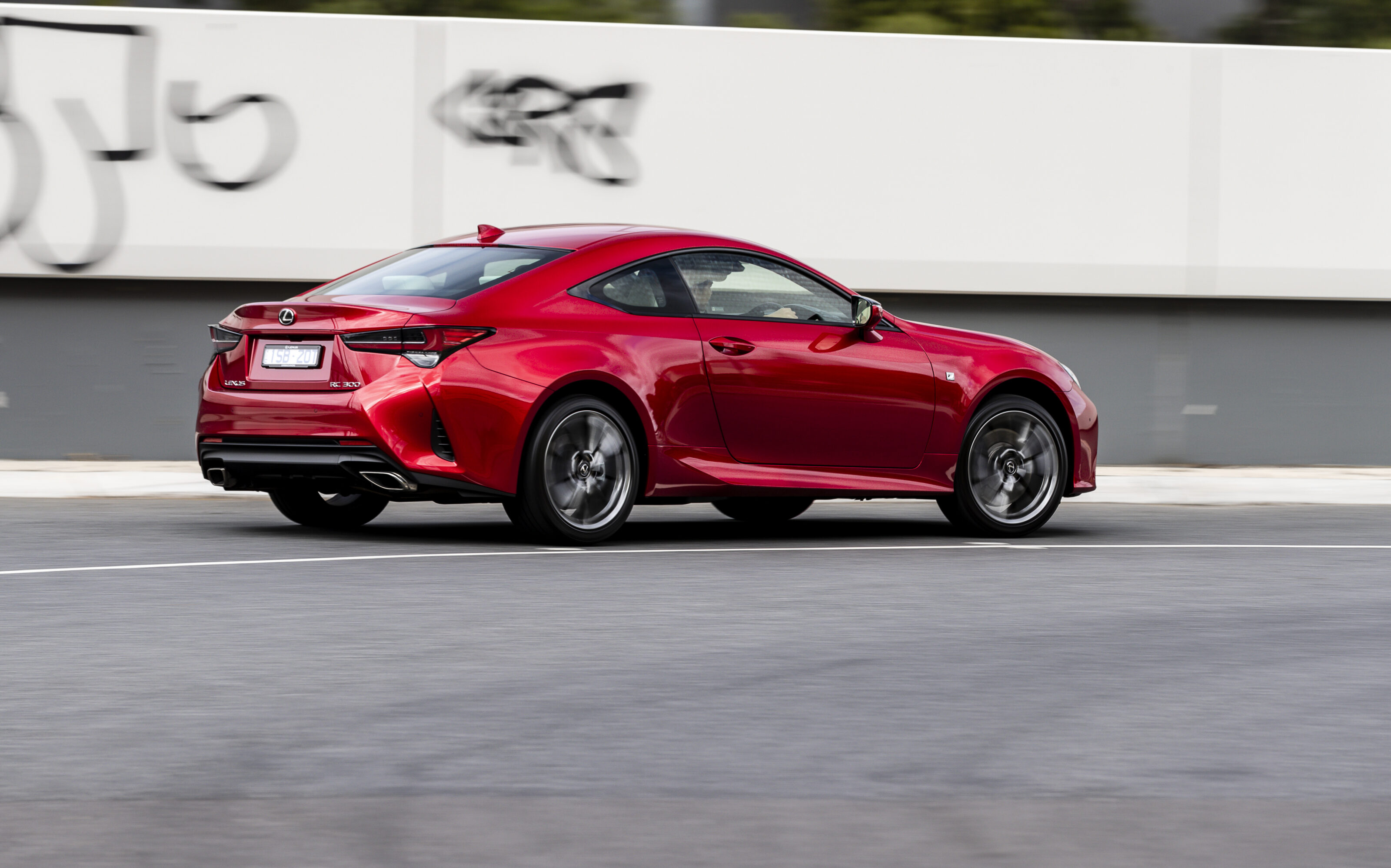
In the inner-city setting, in its default comfort mode, the RC’s cossetting ride irons out imperfections beautifully with little effort or fuss. Its default softly sprung damper settings, however, do yield perceptible pitch and body roll under load.
Flicking the rotary dial into Sport S mode most noticeably firms up the adaptive dampers and wakes up the default lazy pedal-mash throttle calibration. This soon became my default driving mode, introducing a greater immediacy to inputs, and perhaps more closely aligned in feel to the default modes of other popular competitors.
The added Sport S+ mode amplifies these effects and is likely beyond necessity in an urban environment, instead best reserved for talking a flowing country road.
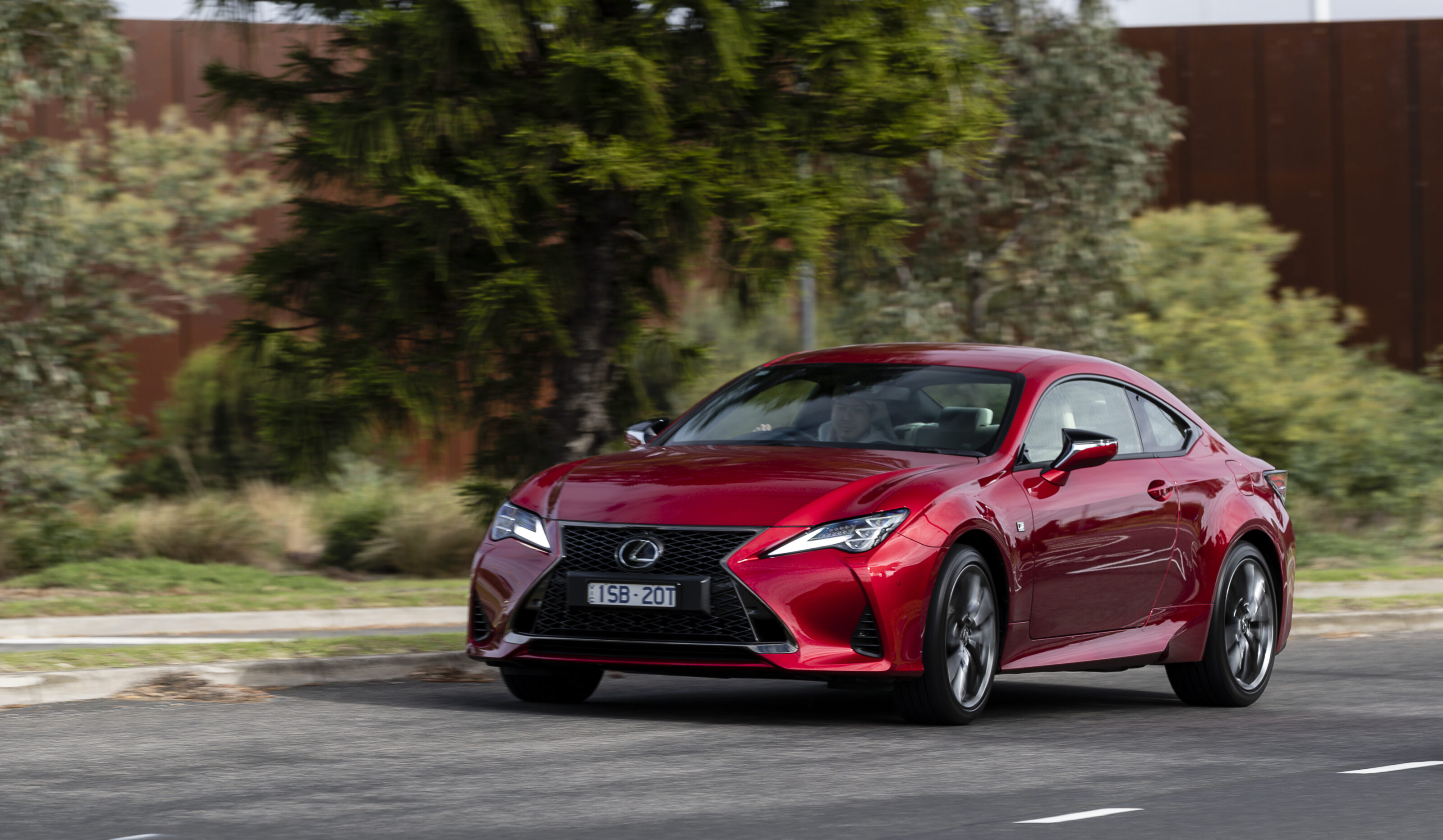
It’s here where the RC coupe finally gives hint to the hidden athleticism buried beneath its well-balanced chassis. The steering, which possesses a relaxed – if slightly vague – on-centre feeling, improves in precision with larger steering inputs. The eight-speed transmission can be somewhat indecisive about its gearing when left to its own devices, however, and is prone to exiting a corner in too high a gear.
Taking shifts into your own hands is not always a flawless solution as the gearbox software attempts to predict your gear changes for you. Downshifting under braking on corner entry can see the gearbox skip down another gear for you, leading to instances where you end up in a gear lower than you wanted should you intuitively grab the paddles twice. The penalty is greater in the small four-cylinder too, as the revs will be sent skyward as the powertrain falls out of its main operating window between 3000 and 5000rpm.
Indeed, the RC 300 will be a masterclass in momentum driving to those who live with it. Muck up one corner, and you’ll be spending the next few turns working to earn back your speed. While this in itself can be an engaging, fun and rewarding exercise for the keenest of drivers, it can conversely be terribly frustrating for those expecting a more instant dose of gratification.
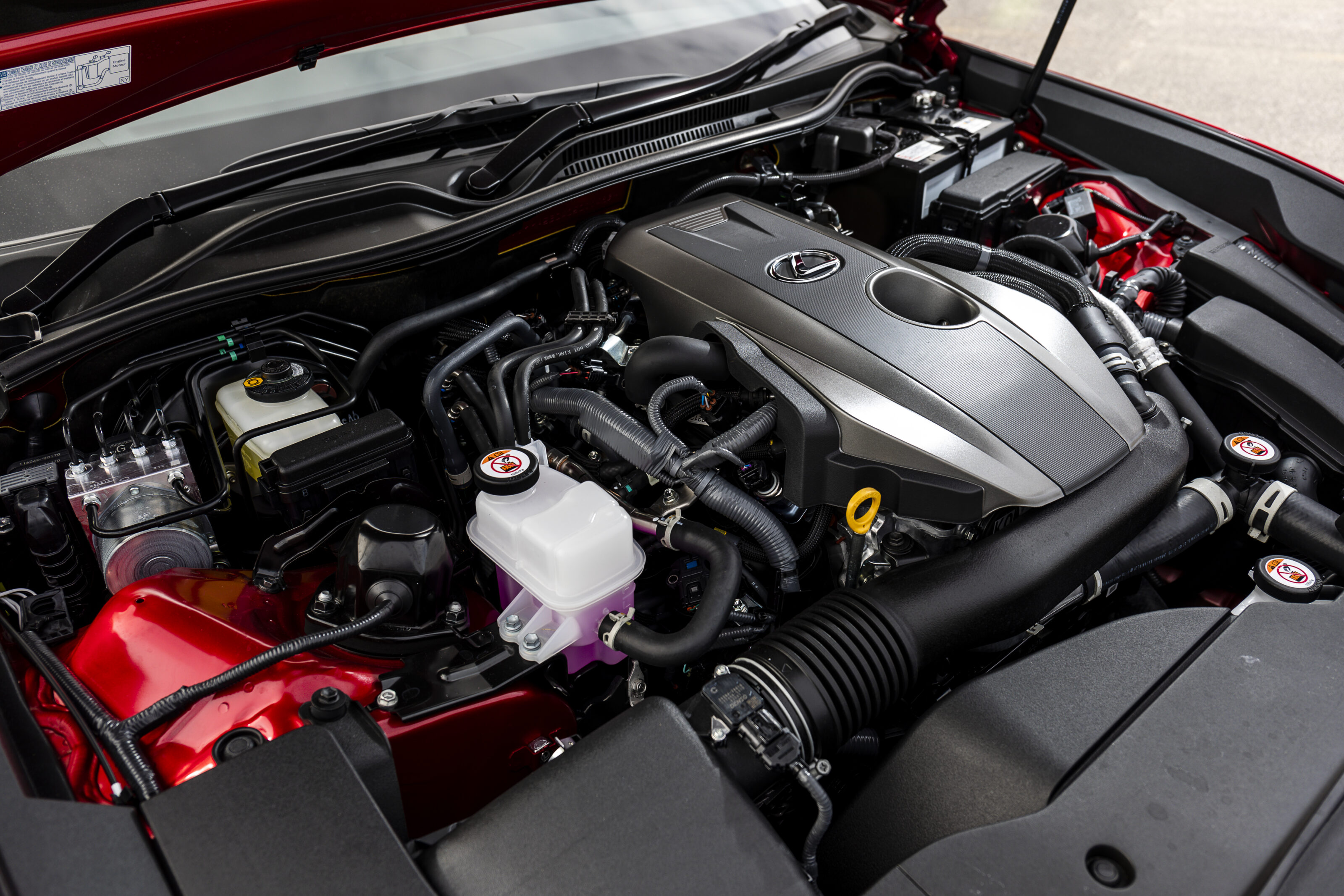
And that’s the overwhelming takeaway from the RC 300 F Sport experience. Its rather lacklustre powerplant simply hampers what is otherwise, frankly, a lovely and stylish cruiser.
Upon further reflection, the RC 300 F Sport suits someone who prioritises image, features and finish with nary a care for what’s under the bonnet – and that’s okay. It’s a beautiful thing to live with and is functional, well-priced and well built. What’s more, you won’t find a comparable coupe with more power at this price point from Audi, Mercedes or BMW.
But if you’re reading MOTOR, we know you’re not that sort of person. And if you have higher demands for vehicle dynamics and driver engagement, the four-cylinder Lexus RC will likely leave you wanting.
You may find a solution elsewhere in the Lexus dealership, however. For just $3000 more you can step into the larger 3.5-litre naturally aspirated V6-powered RC 350 F Sport, which yields a further 30Nm and 53kW, as well as extra equipment such as variable-ratio steering and dynamic rear-wheel steering. Well worth the money if you ask us.
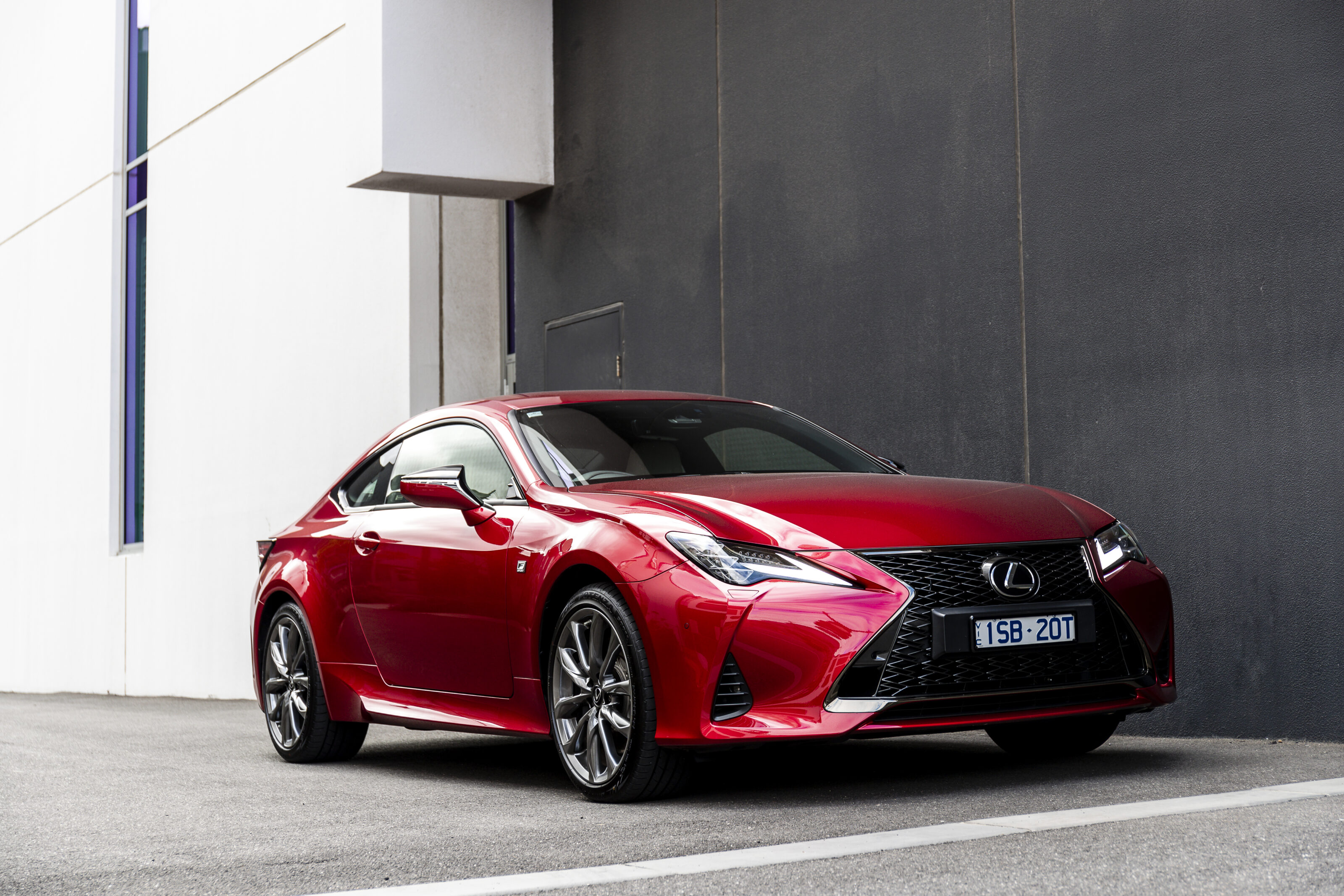
Lexus RC 300 specs
Engine: 1998cc, I4, DOHC, 16v, turbocharged Power: 180kW @ 5600rpm Torque: 350Nm @ 4000rpm 0-100km/h: 7.0sec (claimed) Weight: 1620kg Price: $75,736
Things we like
- Well-equipped
- Style in spades
- Lovely day-to-day driver
Not so much
- Characterless engine
- Outmoded tech compared to rivals
- Trackpad interface
We recommend
-
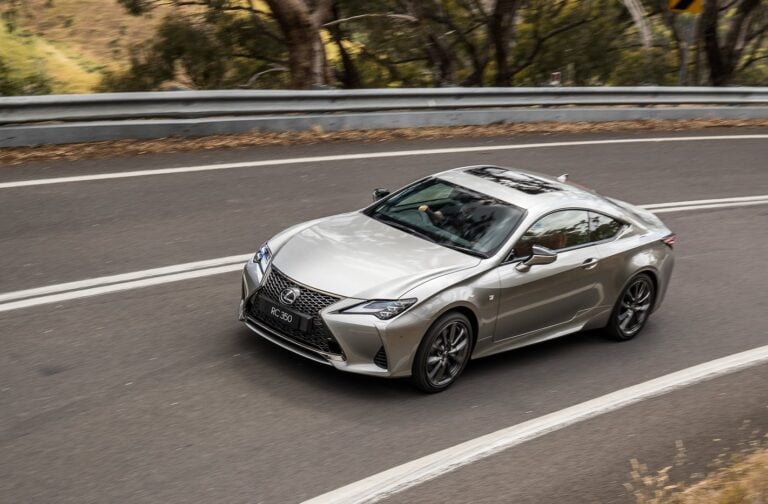 News
NewsNew tech for 2021 Lexus RC range
Powertrain, tech, equipment and safety updates inbound for 2021 Lexus RC range
-
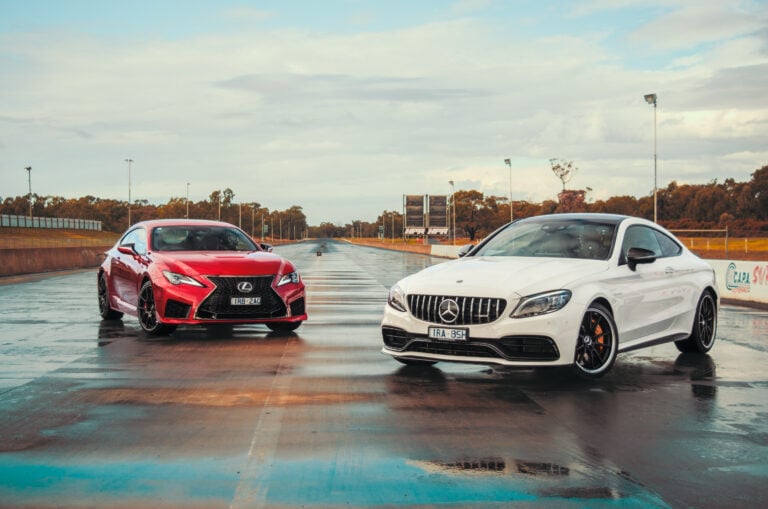 Features
FeaturesTraction Control: Mercedes-AMG C63 S and Lexus RC F throw down in the wet!
Dreary conditions level the playing field as Lexus’ old-school V8 coupe takes on AMG’s twin-turbo powerhouse


